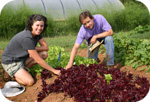
College News
CCCC Land Lab connects people with food
10.01.2006 • College & Community
PITTSBORO - The feel of fertile earth and the sight of healthy vegetables ready for harvest bring a smile to the face of Cheryl McNeill.
Since August, McNeill has been the manager of the land laboratory for Central Carolina Community College’s Sustainable Agriculture program at its Pittsboro Campus. The lab is a two-acre plot of land, part of which is farmed by the program’s students.
McNeill, originally from Virginia, has her bachelor’s degree in biology from Virginia Technical School. She worked as a medical research technician, analytical chemist and other lab jobs in Roanoke and the Raleigh area until about five years ago. Then, she and her husband, Gil, a self-employed software engineer, decided to make some major changes in their lifestyle. They were looking for ways to be more responsible in how they lived, such as growing their own food.
That’s where sustainable agriculture came in. According to Robin Kohanowich, lead instructor for the program, sustainable agriculture has three components: economic profitability for the farmer, social responsibility to the community and environmental quality.
“People like to say that sustainable agriculture is good for the farmer, good for the land and good for the community,” Kohanowich said.
McNeill, a Pittsboro area resident, was attracted to CCCC’s sustainable agriculture program and started taking classes four years ago. She realized she loved working with the soil and plants, finding a sense of personal satisfaction that had been lacking in her other jobs. That led her to stay in the program. She became student manager of the program’s Community Supported Agriculture project and, in August, manager of the land lab.
“It’s very rewarding, very demanding, being manager, but I feel it’s more rewarding to do this than have my own farm because I’m helping a lot of people,” she said.
The lab has only about ½ acre under cultivation at any one time. The rest is in cover crops to prevent erosion and to fix nutrients in the soil. What the students grow on that ½ acre supplies the vegetables for the student-run Community Supported Agriculture program. For about 44 weeks of the year, the land lab harvests enough vegetables to sell a week’s supply to the 48 customers on its list, most of them college employees and students. They are sold at market price and the money goes back into the program.
“These are the best vegetables you could ever eat,” said Sanford resident Gwen Glover, retired CCCC librarian. “Knowing they’re grown in the best way, without damaging the crops or soil, makes it even better.”
The Sustainable Agriculture program has about 25 curriculum students enrolled this semester, working on degrees or certificates. Approximately 70-80 other students are taking the courses through the Continuing Education non-degree program.
Current CSA student manager Phil Roof, of Bahama, wants to start his own community-supported organic farm after he graduates this year. Before choosing sustainable agriculture as a career, he worked in college administration for 15 years, first at Duke University and then at Meredith College, where he was financial aid director.
“The public is coming to understand the importance of locally grown organic produce,” he said.
He cited the recent outbreak of E. coli in the nation’s spinach supply that, to date, has infected 199 people in 26 states and killed at least three. The federal government has traced it to California, but has not been able to pinpoint the site of the infection. It has advised consumers not to eat spinach.
For Roof, that is a vivid example of why locally grown, organic produce is so important to the health of people and their environment - and he wants to be part of this growing trend.
Kohanowich summed up the interest in sustainable agriculture: “People want to get connected to the food they eat,” she said.

Cheryl McNeill (left) has been manager since August of the Land Laboratory of Central Carolina Community College’s Sustainable Agriculture program. The program, located on the Chatham County Campus in Pittsboro, teaches students how to have a good harvest by keeping the soil and plants healthy. McNeill and Phil Roof, student manager of the program’s Community Supported Agriculture project, look over an abundant harvest of green baronet and purple merlot lettuce.
- Central Carolina Community College
- Serving Chatham, Harnett, & Lee Counties, NC
- 1-800-682-8353

